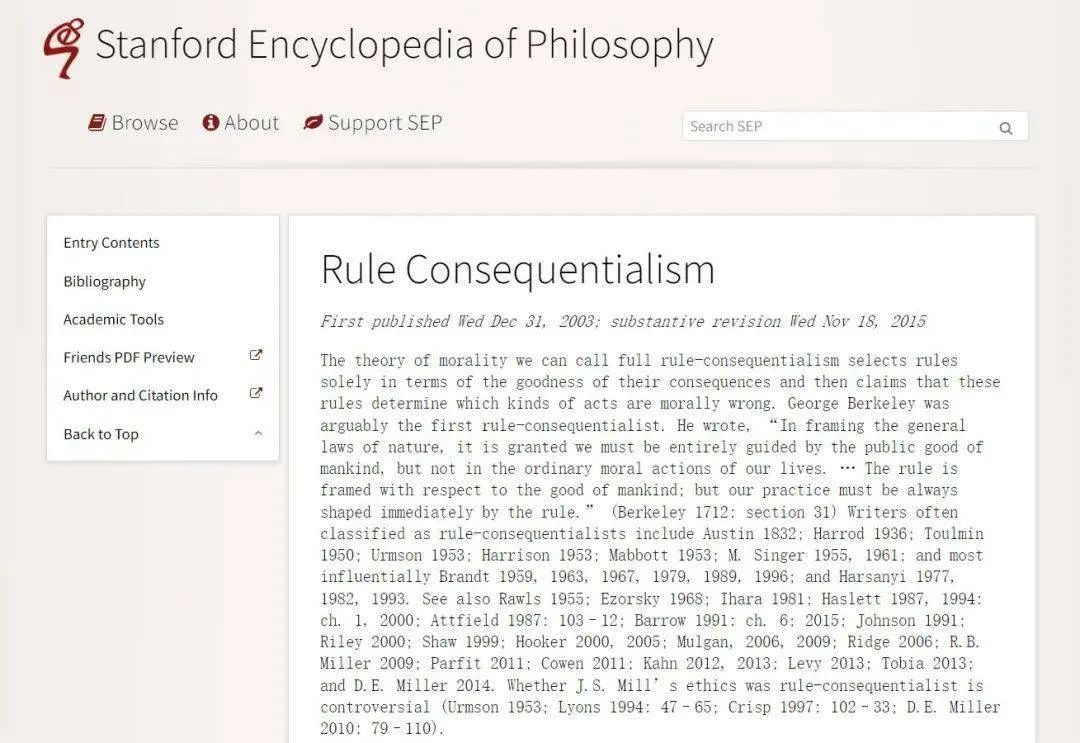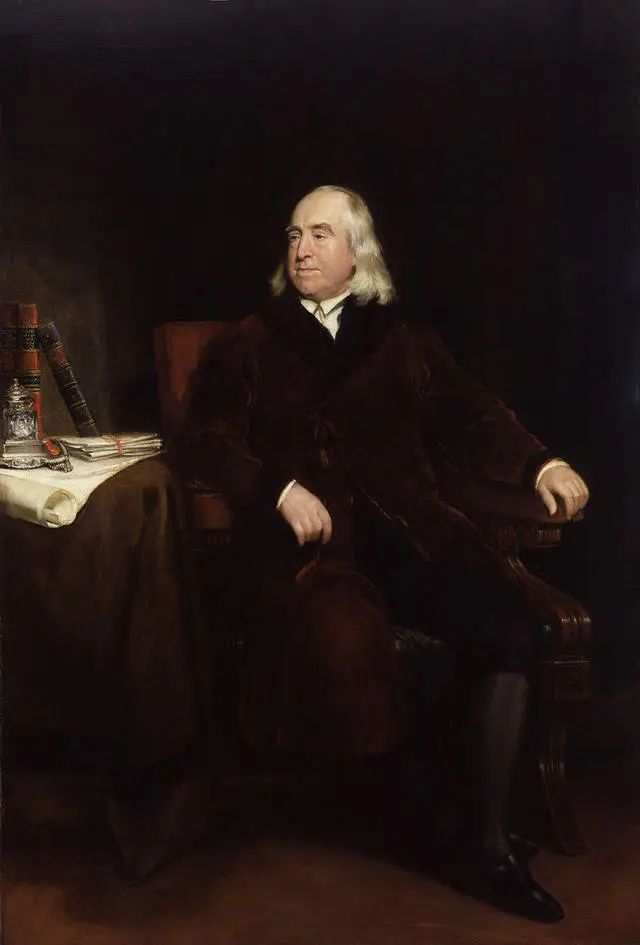当前位置:首页 » 深国交哲学社 » 正文
-

本文系武汉大学哲学学院 20 级现代哲学国际班新年献「译」 斯坦福哲学百科全书词条:规则后果主义
译者:鲁一帆(译 1-5 节)李若菡(译 6-9 节)
校对:葛四友
2003 年 12 月 31 日星期三初版;2015 年 11 月 18 日星期三实质性修订
我们可以称之为完整规则后果主义的道德理论,它只根据后果来挑选规则,并且声称这些规则决定了哪种行为在道德上是不当的。贝克莱(George Berkeley)可以说是第一位规则后果主义者。他这样写道:「在制定一般的自然法时,指引我们的必须完全是人类的公共利益,而非我们生活中的日常道德行为……尽管规则是根据人类利益制定的,但直接塑造我们实践的必须是规则。」(Berkeley 1712:第31节)通常被划分为规则后果主义者的学者包括澳斯汀(Austin 1832)、哈罗德(Harrod 1936)、图尔敏(Toulmin 1950)、乌尔逊(Urmson 1953)、哈里森 (Harrison 1953)、麦伯特(Mabbott 1953)、M.辛格(M. Singer 1955, 1961),以及最具影响力的布兰德特(Brandt 1959, 1963, 1967, 1979, 1989, 1996)和 哈萨尼(Harsanyi 1977, 1982, 1993),还包括罗尔斯(Rawls 1955)、埃佐斯基(Ezorsky 1968)、伊哈拉(Ihara 1981)、 哈斯利特(Haslett 1987, 1994: 第 1 章, 2000)、阿特菲尔德(Attfield 1987: 103–12)、 巴罗(Barrow 1991: 第6 章, 2015)、约翰逊(Johnson 1991)、莱利(Riley 2000)、萧(Shaw 1999)、胡克(Hooker 2000, 2005)、马尔根(Mulgan, 2006, 2009)、里奇(Ridge 2006、R.B. Miller 2009、 Parfit 2011、Cowen 2011、 Kahn 2012, 2013)、列维( Levy 2013)、托比亚( Tobia 2013),以及米勒(D.E. Miller 2014)。密尔(J.S.Mill)的伦理学是否是规则后果主义还存在争议(Urmson 1953;Lyons 1994:47-65;Crisp 1997:102-33;D.E.Miller 2010:79-110)。 l 1. 效用主义 l 2. 福利 l 3. 其他应当促进的善 l 4. 完整规则后果主义 l 5. 全域后果主义 l 6. 构造完整的规则后果主义 ○ 6.1实际利益与预期利益 ○ 6.2遵守与接受 ○ 6.3完全接受与不完全接受 l 7. 支持规则后果主义的三种论证方法 l 8. 规则后果主义必定会蜕变、不融贯或者规则崇拜吗? l 9. 对规则后果主义的其他反驳 l 参考文献 l 学术工具 l 其他互联网资源 l 相关条目 
效用主义 当且仅当某种道德理论只根据后果的善性质来评价行动、性格特征、实践和制度,这样的理论才是某种形式的后果主义。效用主义是史上最有名的后果主义。效用主义仅根据总体净效益来评价行为、性格特征、实践和制度,而总体净效益通常指加总的福利或福祉。加总福利的计算方法是不偏不倚地计算每一个个体的收益或损害,然后将所有收益和损害相加,从而得出一个总值。但是,何为福利的最佳论说,后果主义者对此颇有争议。 
福利 古典效用主义者(如边沁(Jeremy Bentham)、密尔(J. S. Mill)和西季威克(Henry Sidgwick))将收益和损害看作只是与快乐与痛苦有关。福利就是快乐减去痛苦的这种观点一般被称为享乐主义。尽管享乐主义已经变得越来越复杂(Parfit 1984:附录一;Sumner 1996;Crisp 2006;de Lazari-Radek and Singer 2014 年:第 9 章),但它仍然承诺这一论点:个人生活之好坏完全取决于其快乐减去痛苦,尽管快乐和痛苦的理解变得非常宽泛。 
边沁肖像
即使我们非常宽泛地理解快乐和痛苦,享乐主义仍然面临各种困难。其中最主要的困难在于,除自己的快乐和痛苦之外,许多人(如果不是全部的话)还非常关心其他事物。当然,这些事物之所以重要,可能是作为实现快乐和避免痛苦的手段。但是,许多人对这些事物的强烈关注,超过了其享乐主义的工具价值。例如,许多人想知道各种事物的真理,即使这并不会增加其(或其他人的)快乐。另一个例子是,许多人想要有所成就,也不仅仅是出于这些成就所能带来的快乐。同样,许多人对其家人和朋友福祉的关爱也不是工具性的。对于这些观点尤其是最后一种观点,有着与享乐主义相竞争的一种解释,即认为除了自己的福利外,人们还关心许多其他东西。 说得通的任何福利观都会接受,人们在欲望得到满足时的那种满足感会增加其福利;说得通的任何福利观同样也会接受,由于欲望未得到满足的那种沮丧感会减少其福利。有争议的是,除了影响人们的满足感或沮丧感外,某人欲望的实现是否自身就是有益的。享乐主义的答案是否定的,它声称只有对满足感或沮丧感产生的影响才是重要的。 另一种不同的福利理论给出了肯定的答案。这一理论认为,行为者任何欲望的满足都构成了行为者的利益,即使行为者从不知道欲望已经得到满足,或者行为者没有从欲望满足中得到任何快乐。这种福利理论通常被称为福利的欲望满足论。 显然,福利的欲望满足论比享乐主义更为宽泛,因为欲望满足论认为不只有快乐才能构成利益。但是,我们有理由认为这一宽泛理论过于宽泛。一方面,人们可能会有这样的合理欲望——这种欲望与自己的生活毫不相干,从而与自己的福利无关(Williams 1973:262;Overvold 1980、1982;Parfit 1984:494)。比如我欲望异国他乡的饥民获得充饥的食物,我的这种欲望得到满足并不有益于我。 另一方面,人们也可能为了自身而有荒谬的欲望。假设我欲望数清楚这条路的草坪上有多少草叶。如果我能从这样做的行为中获得满足感,那么这种满足感就构成了我的利益。但是,单纯地满足我数清楚草坪上所有草叶这一欲望,这无法构成我的利益(Rawls 1971: 432; Parfit 1984: 500; Crisp 1997: 56)。 我们经过仔细反思后也许会认为,只有欲望具备某些内容时,其满足才能增加福利。例如,我们可能会认为,满足某人对快乐、友谊、知识、成就或其自主性等这样的欲望,才会确实增加其福利,但满足她对任何其他事物的欲望,都不会直接有益于她(尽管她从这些满足中获得的快乐会)。如果我们这样想,我们似乎是认为存在一个事物清单,它们会构成所有人的福利(Parfit 1984: 附录一;Brink 1989: 221-36;Griffin 1996: 第 2 章;Crisp 1997:第 3 章;Gert 1998:92–4; 阿内森1999a)。 只要有待促进的善属于福利,那么该理论就仍然是效用主义的。效用主义还有很多可说的。很明显,生活过得如何是很重要的。道德在根本上要是不偏不倚的,也就是说,在道德最为根本的层面上,不管是男人还是女人,强者还是弱者,富人还是穷人,黑人、白人、拉美洲人,或是亚洲人等,这些人都是同样重要的,这一观念是极有吸引力的,如果不是说完全不可抗拒的话。而效用主义把这个同等重要可行地诠释为,在计算总体福利时,一个人的损益与任何他人的损益,只要两者相同就要做同样的计算,既更不多,也不更少。 
其他需要促进的善 后果主义家族中的非效用主义成员是这样的理论,它们主张只根据后果的善性质来评估行为、性格特征、实践以及制度,但是这里的善并不局限于福利。「非效用主义」在这里的意思是「非纯粹效用主义」,而不是「完全非效用主义」。当学者声称自己是后果主义者而不是效用主义者时,他们通常是在表示:其根本的道德评价不只依据福利,还依据一些其他善。 这些其他善是什么呢?最常见的答案是正义、公平和平等。 根据柏拉图的说法,正义是「给予每个人以其应份(due)」(《理想国》第一卷)。我们可能会认为,人们的应份是什么,这是人们该有什么的问题,要么因为他们应得它,要么因为他们对其享有道德权利。假设我们将这些观点插入后果主义,那么我们得到的是这样的一种理论:评价事物的依据不仅是能产生多少福利,还有人们在何种程度上得到其应得之物,道德权利在何种程度上受到尊重。 然而,后果主义要是采取这种思路的话,其解释抱负就会受到限制。一个理论只是简单地预设的东西,它并没有对之做出解释。如果后果主义理论既预设正义是由这样那样的要素构成的,还预设正义是需要被促进的事物之一,那么它就并没有解释正义的成分为什么是重要的。它既没有解释什么是应得,也没有解释道德权利的重要性,更不用说决定这些道德权利的内容。但对于后果主义者来说,这些问题太过重要、太有争议,不能留下这些问题不做解释或者保持开放。如果后果主义要提及正义、应得和道德权利,那么它就需要分析这些概念,并辩护它为什么要给予它们那类作用。 对公平也可以提出同样的问题。如果后果主义理论预设了公平的论说,并且只是简单地规定要促进公平,那么该理论并没有解释公平。但公平(像正义、应得和道德权利一样)对于后果主义是一个太过重要的概念,不能不做解释。 后果主义者应对正义和公平的方式之一是,主张正义和公平就在于符合一组得到辩护的社会实践,并且这种辩护就在于它们通常能促进整体福利与平等。实际上,这种主张或许就是在说,人们有什么样的应份,有什么样的道德权利,公平与正义有什么要求,都要符合任何会促进整体福利和平等的实践。 然而,平等是否需要被加进这个表述,这是颇具争议的。许多人认为,纯粹的效用主义表述就有足够的平等主义蕴含。他们认为,即使目标仅仅是促进福利,而不是促进福利加上平等,也仍然存在虽然偶然但却非常广泛的人性事实,这些事实会推动物质资源走向平等分配(Brandt 1979)。 根据「物质资源的边际效用递减定律」,个人拥有的物品单位越多,增加一单位物品的获益就会越少。假设我要四处走动,从开始只能步行到后面有一辆自行车,或者我住在一个非常寒冷的地方,我从没有保暖的外套到有一件。相较于从 9 辆车到 10 辆,我从拥有第一辆获益更多,相对于从 9 件外套到 10 件,我拥有第一件获益更多。 边际效用递减定律也存在例外。大多数的例外情况会是增加一单位的物质资源,会将某人推过某个重要的门槛。例如,能拯救某人生命的那种食物、药丸或空气,或者再获取一辆汽车能将一位有竞争力的收藏家推至第一名的位置。在这样的情况下,将某人置于临界值之上的一单位资源,它很可能与之前的任一单位是同样有益的。不过,一般来说,物质资源确实存在着递减的边际效用。 除了物质资源边际效用递减的假设之外,我们再加上一个假设,即从相同的物质资源中,不同的人通常会获得大致相同的利益。同样,这个假设也有例外。如果你生活之地气候严寒,而我生活之地气候炎热,那么对于同样的保暖外套,你的获益会比我多很多。 但是,假设我们住在同一个地方,这里的冬天很寒冷,有很好的自行车道,并且没有公共交通。假设你有十辆自行车和十件外套(虽然你也不是在争夺自行车或外套收藏家的头衔)。同时,我很穷,既没自行车也没外套。那么,把你的一辆自行车和一件外套分给我,你由此受到的损害很可能会小于我的获益。只要社会中的资源分配不均,这种现象就是普遍存在的。无论这种现象出现在哪,只要一种道德在根本上强调不偏不倚,那么它就会面临要把富人的资源分给穷人的那种压力。 然而,也存在一些偶然但广泛的人性事实,这些事实支持的那种实践会导致资源的不平等分配。首先,更高水平的总体福利需要更高水平的生产率(想想提高农业生产率带来的福利增长)。在许多经济领域,为高效率的生产提供高物质回报,这看起来是提高生产率中可接受的最有效方式。有些个人和团体会比其他的更为高效(特别是在有激励方案的情况下),因此,为了提高生产率而提供物质奖励的实践,就会造成资源分配的不平等。 所以,一方面,物质资源的边际效用递减带来的压力会支持更平等的资源分配。另一方面,提高生产率的需求带来的压力则支持激励计划,可以预见这会带来资源分配的不平等。效用主义者和大多数其他后果主义者发现,他们需要平衡这组对立的压力。 需要注意的是,这些压力是关于资源分配的。还有一个更进一步的问题,它关乎福利本身应该如何平等分配。近来许多学者认为效用主义对福利分配漠不关心。想象一下,在这样两个后果中进行选择,一个后果的总体福利较大但分配不平等,另一个总体福利较小但分配平等。一般认为,效用主义者会支持有更大总体福利的后果,即使其分配较不平等。 为了说明这一点,以人为的简单人口为例,只分为两组。 福利单位 两组的总福利 选择 1 每人 每组 A 组 1 万人 1 10,000 B 组 10 万人 10 1,000,000 不偏不倚地计算: 1,010,000 福利单位 两组的总福利 选择 2 每人 每组 A 组 1 万人 8 80,000 B 组 10 万人 9 900,000 不偏不倚地计算: 980,000 许多人会认为上面的选项 2 比选项 1 更好,并且可能会认为,这两个选项之间的比较表明,总是有压力支持更大的福利平等。 然而,正如帕菲特(Derek Parfit,1997) 特别论证的,我们不能太过轻率。考虑以下选择: 福利单位 两组的总福利 选择 1 每人 每组 A 组 1 万人 1 10,000 B 组 10 万人 10 1,000,000 不偏不倚地计算: 1,010,000 福利单位 两组的总福利 选择 3 每人 每组 A 组 1 万人 1 10,000 B 组 10 万人 1 100,000 不偏不倚地计算: 110,000 福利平等是否如此重要,以至于选项 3 优于选项 1 呢?考虑帕菲特的一个例子,假设只有让每个人都完全失明才能实现视力方面的平等,道德会要求这样的「拉低」吗?甚至,在道德上难道这是可欲的吗? 如果我们的答案是否定的,那么我们可能会认为,一般而论的福利平等并不真正是一个理想(参见 Temkin 1993)。只有对穷人有利时,富人的损失才是正当的。我们本认为是支持福利平等的那种压力,实际上是支持拉高福利水平的压力。我们可能会说,福利受影响者的境况越差,福利的增加就越重要。这种观点逐渐被称为优先主义(Parfit 1997;Arneson 1999b),它有着强大的直觉吸引力。 要明白优先主义是如何运作的,考虑一个简化的例子,假设把最贫困群体的福利算作富裕群体福利的五倍。上表中的选项 1 总计为 (1×5×10000)+(10×100000),共计 1,050,000 单位的福利。最贫困群体的福利再次算作五倍,选项总计为 (8×5×10000)+(9×100000),共计 1,300,000 单位的福利。于是选项 2 在道德上优于选项 1,这与一般反应相一致。 当然,在真实的案例中,社会从来不是只有一种划分。更确切地说,是有一个这样的标度(scale),从最差的到不那么糟糕的,再依此类推直到最好。优先主义承诺,在这个标度上不同位置的人,其福利会有不同的重要程度:个人的境况越差,其福利水平就越重要。 但这引起人们对优先主义的两个严重担忧。第一个担忧有关优先主义难以非任意地确定:贫困者的福利应该有多大的重要性。例如,最贫困者的一单位利益,是否应该算作最富裕者的同等利益的 10 倍,是否算作平均福利者同等利益的 5 倍?或者这个乘数应该是 20 和 10,或者 4 和 2?有关优先主义的第二个担忧是,更为重视一些人而不是另一些人的福利增长,这是否与根本的不偏不倚相矛盾(Hooker 2000:60-2)。 这里并不适宜深入优先主义及其批评之间的争论。因此,本文的其余部分将暂且搁置这些争论。 
完整规则后果主义 后果主义者区分了其理论的三个组成部分:(1) 什么使得行为在道德上不正当的论点,(2) 行为者应该使用什么程序来做出道德决策的论点,以及 (3) 道德制裁(如责备、内疚和赞扬)在什么条件下是恰当的论点。 规则后果主义要是包括对所有这三个问题的规则后果主义准则,我们就称之为完整的。因此,完整规则后果主义声称,得到后果辩护的规则禁止什么行为,什么行为就是不当的;得到后果辩护的规则要求如何做出决策,行为者就应当如何做出决策;得到后果辩护的规则决定什么样的条件下应该做出道德制裁,那在该条件下就应该做出道德制裁。 完整规则后果主义者可能认为,关于这三个不同的主题,实际上只有一套规则。或者他们可能认为,有几套不同的规则,它们在某种意义上是相互对应或互补的。 比区分不同种类的完整规则后果主义更重要的,是区分完整规则后果主义和部分规则后果主义。部分规则结果主义可能有多种形式,我们这里聚焦于最常见的一种形式,它主张行为者应该依据得到后果辩护的规则来进行道德决策,但并不主张这些规则决定了道德上的不当性。部分规则后果主义者通常接受这一理论:道德上的不当性直接取决于行为的后果。关于不当性的这种理论被称为行为后果主义。 区分完整的和部分的规则后果主义,可以澄清行为后果主义和规则后果主义之间的差异。行为后果主义最好被理解为只坚持以下主张: 不当性的行为后果主义标准:一个行为是不当的,当且仅当该行为的结果没有其他替代行为的结果好。 当面临道德不当性的这一准则时,许多人自然而然地假定,决定做什么行为的方法就是应用该准则: 道德决策的行为后果主义程序:在任何情况下,行为者都应该通过计算哪种行为会产生最大的好处来决定做什么。 然而后果主义者几乎从未做出辩护,要把这种决策程序作为道德决策的一般和典型方式(Mill 1861: 第 2 章; Sidgwick 1907: 405–6, 413, 489–90; Moore 1903: 162–4; Smart 1956: 346; 1973: 43, 71; Bales 1971: 257–65; Hare 1981; Parfit 1984: 24–9, 31–43; Railton 1984: 140–6, 152–3; Brink 1989: 216–7, 256–62, 274–6; Pettit and Brennan 1986; Pettit 1991, 1994, 1997: 156–61; de Lazari-Radek and Singer 2014: 第10章)。决策的行为后果主义程序为什么会是适得其反的,有许多令人信服的后果主义理由。 首先,对于各种行为的后果,行为者通常都没有详细信息。
第二,获取此类信息的成本,常常要比这类有待做出的决策所涉及的利益要高。
第三,行为者即使拥有进行计算所需的信息,也可能计算出错。(特别是行为者的天然偏见入侵、计算非常复杂或必须快速决策时。)
第四,还有我们可以称为预期效应的因素。想象一下,在一个社会里,人们知道,其他人对自己和所爱的人有天然的偏向,但会努力计算整体利益来做出每一个道德决策。在这样的社会里,每个人都很可能担心,只要其他人说服自己,毁诺、偷窃、撒谎、甚至袭击等会产生最大的整体效益,他们就会这样做。在这样的社会里,人们不会觉得彼此是可以信任的。 第四个考虑的争议性比前三个更大。例如,哈奇森(Hodgson 1967), 霍斯佩斯(Hospers 1972) 和哈萨伊(Harsanyi 1982) 主张信任会崩溃,但辛格(Singer 1972) 和刘易斯( Lewis 1972) 则主张不会。 不过,大多数哲学家都接受这一观点:出于上述四个理由,使用决策的行为后果主义程序不会使善最大化。因此,哲学家们即便支持道德不当性采用行为后果主义标准,也仍会拒绝道德决策采用行为后果主义程序。取而代之的是,他们通常支持以下观点: 决策的规则后果主义程序:至少在通常情况下,行为者应该据之做出行为决策的是这样的规则(比如「不要伤害无辜的他人」、「不要盗窃或破坏他人的财产」、「不要违背承诺」、「不要撒谎」、「要特别关注家人和朋友的需求」、「有益于一般性的他人」),它们的接受应当能产生最好的后果。 既然不当性准则的行为后果主义者通常接受这种决策程序,那么行为后果主义者实际上就是部分规则后果主义者。通常,道德不当性采用的是行为后果主义准则,而恰当决策采用的是规则后果主义程序,这二者的结合就被学者称为间接后果主义。 一般来说,完整规则后果主义所认可的决策程序是社会最好接受的。之所以需要「一般来说」这一限定条件,是因为存在另一些规则后果主义的版本,那里规则可以相对于小团体甚至是个人(D.E.Miller 2010;Kahn 2012)。行为后果主义坚持的决策程序是个体最好接受的。因此,根据行为后果主义,既然杰克和吉尔的能力和处境可能会大不相同,那么二者接受的最佳决策程序也可能不同。然而,在实践中,行为后果主义者通常在很大程度上会忽略这种差异,并认可上述规则后果主义的决策程序(Hare 1981,第 2、3、8、9、11 章;Levy 2000)。 当行为后果主义者认可上述规则后果主义决策程序时,他们就承认,遵循该决策程序并不能保证我们的行为会有最好的后果。例如,我们遵循不去伤害无辜他人的这种决策程序,有时候这会阻止我们去做有最好后果的行为。同样,在某些情况下,偷窃、违背承诺等会产生最好的后果。尽管如此,从长远和总体来看,相较于对行为逐个进行后果主义计算来说,遵循一般禁止此类行为的决策程序可能会产生更好的后果。 因为行为后果主义者通常认同决策的规则后果主义程序,所以,将某位哲学家归类为行为后果主义者还是规则后果主义者,就可能会存在疑问。例如摩尔(G.E. Moore,1903,1912) 有时被归类为行为后果主义者,有时则被归类为规则后果主义者。像其老师西季威克(Henry Sidgwick)等许多人一样,摩尔将道德不当性的行为后果主义准则与决策的规则后果主义程序结合起来。只是他比大多数人更进一步,强调离开决策的规则后果主义程序会带来危险(见 Shaw 2000)。 
全域后果主义 一些学者提出,后果主义最纯粹、最一致的形式是这样一种观点:一切事物,无论是行为,还是规则、动机、制裁的实施等,都绝对应该根据其后果进行评估。根据佩蒂特和史密斯(Pettitand & Smith,2000) 的看法,这一观点被称为全域(global)后果主义。卡根(Kagan,2000) 将其描绘为多维直接后果主义,鉴于每个事物的评价都是直接根据其后果是否与替代项的后果一样好。 这种全域后果主义与我们称为部分规则后果主义有何不同?我们称为部分规则后果主义的理论,只不过是结合道德不当性的行为后果主义准则和决策的规则后果主义程序。这样界定的话,部分规则后果主义对于道德制裁在何时恰当是保持开放的。 有些部分规则后果主义者认为,只要行为者选择的行为没有产生最佳后果,他们就应该受到责备并感到内疚。但部分规则后果主义者可以采取的一个更合情理的立场是,只要行为者选择的行为是规则后果主义的决策程序所禁止的,他就应该受到责备并感到内疚,不管这个行为是否能产生最佳后果。最后,正如我们的定义,部分规则后果主义相容于这样一种主张:行为者是否应该受到责备或感到内疚,既不取决于他们的行为是否正当,也不取决于他们的行为是否是那种可取的道德决策程序要求的,而是完全取决于这种责备或内疚是否会带来好处。这个恰恰是全域后果主义的制裁观。 全域后果主义受到的一个致命反驳是,若将后果主义准则同时应用于行为、决策程序和制裁实施,就会导致明显的悖论(Crisp 1992;Streumer 2003;Lang 2004)。 假设从整体和长远来看,你要接受的最好决策程序将引导你现在做 x。但还假设在这种情况下,实际产生最佳后果的行为不是 x 而是 y。因此,全域后果主义既要求你使用最好的决策程序,同时又要求你不做这个决策程序挑选出的行为。这似乎是个悖论。 当我们考虑责备和内疚时,情况变得更糟。假设你遵循了最好的决策程序,但你的行为没有产生最好的后果。你要受到责备吗?你应该感到内疚吗?全域后果主义主张:你应该受到责备,当且仅当责备你会产生最好的后果;你应该感到内疚,当且仅当这会产生最好的后果。假设出于某种理由,「因为你遵守规定的决策程序(并因此做 x)而责备你」会产生最好的后果。那么根据全域后果主义,尽管你遵循了该理论指令的那种道德决策程序,但该理论仍要求你受到责备,这无疑是个悖论。或者假设出于某种原因,责备「你有意选择后果最好的行为(y)」,这种责备会产生最好的后果。同样地,虽然你有意选择某道德理论所要求的行为,但该理论却要求责备你,这无疑也是个悖论。 因此,全域后果主义的一个问题是:在其所要求的行为和要行为者使用的决策程序之间,这两者与可责备性之间,它都造成了潜在的缺口。(针对这条攻击路线的明确回应,请参见 Driver 2014:175 和 de Lazari Radek and Singer 2014:315–16。) 但这不是全域后果主义中最常见的问题。相反,它最常见的问题在于其不当性的最大化行动-后果主义准则。根据这一最大化准则,一个行为是不当的,当且仅当该行为未能带来最大善。根据这一准则,某些似乎肯定不当的行为被判定为是正当的,一些似乎正当的行为被判定为不当的。 例如,考虑一个谋杀行为,其后果略好于任何其他行为。那么按照人们最熟悉的不当性的最大化行为-后果主义准则,这一行为并非不当的。还有许多诸如袭击、偷窃、违背诺言和撒谎这样的行为,哪怕做它们会比不做产生的好处会稍微多一点,这些行为依然是不当的。但再次,这种常见的最大化行为-后果主义会否认这一点。 或者考虑某人把一些资源留给自己的孩子或自己,不把它们用于帮助陌生人,即便后者可以获益稍多。看起来很难认为这样的行为是不当的。然而,最大化的行为后果主义准则判定它是不当的。想象一下,为了满足不当性的最大化行为后果主义准则,一个平均福利水平的人要做出多少自我牺牲。事实上,她将不得不持续行动,直到其牺牲对自己造成的伤害大于给他人带来的利益。因此,不当性的最大化行为后果主义准则常被指责其要求高得不合情理。 针对这种最大化行为后果主义的反驳,有种后果主义版本不要求最大化善,它可以避免这种反驳。这种行为后果主义现在被称为知足后果主义。有关这一理论的更多讨论,请参见(百科中)「后果主义(Consequentialism)」条目。 
构造完整的规则后果主义 构造规则后果主义有许多不同的方法。例如,我们对规则的构造,是根据规则实际产生的好处(good),还是根据规则可以合理预期产生的好处;是仅仅根据遵守(compliance)规则的后果,还是根据接受(acceptance)规则产生的更广泛后果;是根据每个人都绝对接受规则的后果,还是根据近乎「每一个人」都接受该规则所产生的后果。接下来的三个小节将阐明,规则后果主义的某些构造方式会比其它方式更可行。构造方式的这些问题,还会影响后几节对规则后果主义经典反驳的讨论。 
实际利益与预期利益 如前所述,规则后果主义要想是完整的,还得以规则后果主义的方式回答三个这样的问题。第一个问题是,什么使得一个行为在道德上是不当的?第二个问题是,行为者应该使用什么程序来做出道德决策?第三个问题是,诸如谴责、内疚和赞扬等这样的道德制裁,它们在什么样的情况下才是恰当的? 正如我们看到的,对决策程序这一问题的回答,完整的规则后果主义者与其他类型的后果主义者是一样的。因此,我们聚焦于可以形成对比的另外两个问题:什么因素使得一个行为是不当的,什么时候制裁才是恰当的。这两个问题的相关程度比我们有时认识到的要更为紧密。 事实上,密尔作为后果主的义创始人之一,早就肯定了它们之间的紧密联系: 我们不会认为任何一件事情是不当的,除非我们认为做了该事的人应该受到某种方式的惩罚——如果不是被法律,至少被其同胞的意见;如果不是被意见,至少是受到自己良心的谴责。(1861年:第5章,第14段)
让我们假设密尔认为:「应该受到惩罚,即使不是被别人惩罚,至少受到自己良心的谴责」大致上等同于「可责备的(blameworthy)」。有了这一假设,我们可以将上述密尔的话理解为,道德不当与可责备是紧密相关的。我们随后可以考虑,如果密尔的这一结合是错误的,这将意味着什么。但我们先来考虑一下,如果密尔是正确的将意味着什么。 思考下述论证,其第一个前提来自密尔: 如果一个行为是不当的,那么它是可责备的。
显然,如果行为者无法预见一个规则会产生次优后果,那么责备行为者接受并遵守这个规则就是不当的。由此,我们得到了第二个前提: 如果一个行为是可责备的,那么允许该行为的规则会产生次优后果就必须是可预见的。
从这两个前提中,我们得出结论: 因此,如果一个行为是不当的,那么允许该行为的规则会产生次优后果就必须是可预见的。
当然,接受某套规则的实际后果与可预见后果不一定是相同的。因此,如果完整的规则后果主义主张,「一个行为是不当的,当且仅当允许该行为的规则有可预见的次优后果 」,那么规则后果主义就不能同时认为,「一个行为是不当的,当且仅当允许该行为的规则有实际的次优后果」。 现在,让我们反过来假设,不当性和可责备性之间的关系远没有密尔所说的那么紧密(参见 Sorensen 1996)。也就是说,假设行为不当性的标准可能完全不同于可责备性的标准。在这种情况下,我们可以持有这样的观点: 不当性的实际规则后果主义标准:一个行为是道德上不当的,当且仅当它被这样的规则禁止——接受该规则实际上产生的效益最大。
和 可责备性的预期规则后果主义标准:一个行为是可责备的,当且仅当它被这样的规则禁止——接受该规则产生的预期效益会最大。
下面是计算一套规则的预期效益的方法。显然,接受一套规则会产生多种可能的后果,假设我们可以确定每个可能后果的价值或负价值,把每个可能后果的价值乘以该后果发生的概率,再把这些乘积全部加起来,由此得出的数字就是该套规则的预期效益。 需要注意的是,并不是说人们对后果概率的任何(不管有多么疯狂的)估计都能用于计算。相反,预期效益的计算应当是用理性的或有辩护的概率乘以可能后果的价值或负价值。 人们可能会相当怀疑这种计算是否经常是可能的。即使这种计算是可能的,它们通常也会是凭印象和不精确的。尽管如此,我们还是能合情理地指望,我们能对备选规则很可能出现的后果做出某些周全(informed)判断,然后根据这种判断做选择。相比之下,我们通常无法知道哪些规则会实际上产生最好的后果。因此,可责备性的预期规则后果主义标准是有吸引力的。 现在我们回到这一提案:尽管可责备性的标准是预期规则后果主义的,但道德不当性的标准是实际规则后果主义的。该提案拒绝密尔将道德不当性与可责备性捆绑在一起的步骤。针对这个提案有一个强有力的反驳:如果道德不当性与可责备性相分离,那么道德不当性的作用和重要性何在? 于是,为了保留道德不当性的明显作用和重要性,致力于可责备性的预期规则后果主义标准的那些人,他们很可能会采纳: 道德不当性的简单版预期规则后果主义标准:一个行为在道德上是不当的,当且仅当它被这样的规则禁止——该规则被接受将产生最大的预期效益。
事实上,一旦明白实际产生的价值量和合理预期的效益之间存在区别,那么完整的规则后果主义者多半会对道德不当性、可责备性和决策程序都采用预期式的标准。 如果就我们所知,没有一套规则比其竞争对手有更大的预期价值,那该怎么办?我们需要修改预期标准以容纳这种可能性: 道德不当性的精致版预期规则后果主义标准:一个行为在道德上是不当的,当且仅当它被这样的规则禁止——该规则被接受将产生最大的预期效益,或者根据最大预期效益有多套规则同样好时,该规则与通常的习俗最接近。
利用与传统道德的接近程度来打破预期价值相同的各套规则之间的僵局,这一论证是基于这样一个观察:社会变革经常会产生意外的负面后果。不仅如此,新规则与传统接受的规则之间的差异越大,意外后果涉及的范围也就越大。因此,当我们判断两套规则有同样高的预期价值时,我们就应该选择与已有道德最接近的那一套(如果两套规则具有同样高的预期价值,而且似乎同样接近传统道德的情况,对此的讨论,请参见 Hooker 2000:115。关于更加微妙的观点,请参见 Hooker 2008:83–4。) 这一点的蕴含是,只有当改变比坚持现状有更大的预期价值时,我们才应当改变现状。规则后果主义显然有能力呼吁改变,但它不赞成为了改变而改变。 毫无疑问,规则后果主义的构造方式需要能够应对预期效益平局。但是,在之后部分中,我将忽略这一难题。 
遵守与接受 规则后果主义的构造还会面临其他重要问题,其中一个问题就是,规则后果主义的构造是应该根据遵守(compliance)规则还是接受(acceptance)规则的后果。诚然,接受规则最重要的一个方面就是遵守规则。而规则后果主义者在其早期表述中,的确明确地提到了遵守。例如,他们说:一个行为是不当的,当且仅当它被这样的规则禁止——遵守该规则会使产生的利益(或预期利益)最大。(见Austin 1832;Brandt 1959; M. Singer 1955, 1961.) 但是,接受规则可能还会产生除遵守规则之外的其它后果。正如,卡根(Kagan,2000:139) 所说,「规则一旦被植入,就可以对后果产生独立于规则对行为的影响的其他影响:比如说,仅仅思考一套规则就可以让人安心,从而有助于幸福。」(关于我们可能称之为规则的「遵守之外的后果」的更多讨论,请参见 Sidgwick 1907:405–6, 413; Lyons 1965: 140; Williams 1973: 119–20, 122, 129–30;Adams 1976, esp. 470; Scanlon 1998: 203–4; Kagan 1998: 227–34.) 毫无疑问地,接受规则的这些后果也应当被纳入到对备选规则的成果收益分析之中。而根据接受规则所产生的后果来构造规则后果主义,就能实现这一点。事实上,对安心和激励作用的考虑,在规则后果主义的发展中起了很大作用(Harsanyi 1977、1982:56-61;1993:116-18;Brandt 1979:271-77;1988:346ff[1992:142ff.];1996: 126, 144; Johnson 1991,特别是第 3, 4, 9 章). 我们需要从遵守规则产生的后果转向接受规则产生的更广泛后果,同样地,我们还需要更进一步:仅仅关注接受规则产生的后果是不够的,我们还忽略了让这些规则在一开始被接受所需的「转变」成本,而这种成本当然是可以产生影响的(Brandt 1963:section 4;1967[1992:126];1983:98;1988:346-47349-50[1992:140-143144-47;1996:126-28145148152223)。 例如,假设有一套相当简单且要求相对较低的规则 A,接受它会产生值为 n 的预期效益;再假设另外一套更复杂且要求较高的规则 B,接受它会产生值为 n+5 的预期效益。因此,如果我们只考虑这两套规则被接受后产生的预期效益,那么规则 B 获胜。 然而,现在让我们加上接受这两套规则的相关成本。让我们假设:由于规则 A 相当简单,要求也相对较低,因此接受它的成本为−1;由于规则B更复杂,要求也更高,因此接受规则B的成本为−7。于是,如果我们比较两套规则时考虑它们的接受成本,那么规则A的预期值为n− 1,规则B的为n+5− 7。也就是说,一旦我们考虑规则的接受成本,那么规则A将获胜。 如前所述,我们把这种使准则被接受的成本叫做「转变成本」。显然,转变必须是从一种安排(arrangement)转变到的另一种安排。我们想象中要转变到的那个安排当然就是接受提出的某套规则,但我们想象中的转变从什么开始呢? 一种回答是,这种转变应当是从社会碰巧接受的任何一套道德规范开始。这似乎是很自然的答案。然而,这其实是一个糟糕的答案,糟糕的原因在于,规则后果主义对提出的某套规则做成本收益分析时,不应当考虑让人们放弃已内化规则所需要的成本。这有两个理由。 其中最重要的理由是,规则后果主义在评估规则时,需要直接或间接地考虑的道德观念只能是源于规则后果主义本身,不能是源于其他道德理论。比如,假设在某个社会里,人们从小的教育就是女人应该服从男人,那么当规则后果主义者在这种条件下评估提出的非性别主义规则时,他们是否应该考虑让人们放弃已内化的性别主义规则以接受新的非性别主义规则的那些成本呢?由于性别主义规则是没道理的,这些规则已被接受这一点不应该影响对规则后果主义的评价。 拒绝那种回答的另一个理由是,它可能会支持一种没有吸引力的相对主义。不同社会的现存道德信念可能有很大差异,因此,如果评价提出的规则需要考虑让已经接受其他规则的人的转变成本,那么转变到相同规则可能会有不同成本。例如,转变到非种族主义规则的成本,从某套种族主义规则开始要远高于从某套非种族主义规则开始。因此,我们构造规则后果主义的可欲方式应该是这样的:它会让上世纪 60 年代的密歇根州和上世纪 60 年代的密西西比州都会采纳同一套规则。 做到这一点的方式就是根据「新一代人」对规则的接受。这样我们基于这些规则会教给尚未接受任何道德教育的儿童假设,由此比较不同备选规则各自的「教育成本」。我们能想象,孩子们起始的自然(非道德)倾向是较偏袒自己和少数他人。我们还应该假设学习每一条规则都会产生相应的认知成本。 这些都是现实主义的假设,有重要的蕴含。其中之一是,规则的成本/收益分析会支持更简单而不是更复杂的规则。当然,拥有更多或更复杂的规则也可能有好处,然而一旦将教学成本计算在内,规则的复杂程度会有上限,这样才使得它比简单准则有更多的预期价值。 另一个蕴含有关牺牲自己帮助他人的规则。孩子们一开始注重自己的满足感,因此要让他们内化那种持续不断为他人做出巨大牺牲的不偏不倚性,成本会极高。当然,这种规则的内化也会带来巨大的好处——主要是对他人的好处。这种收益会大于成本吗? 至少从西季维克 (1907:434) 开始,许多效用主义者理所当然地认为,人类的本性只可能是这两种情况之一:(1) 对某些人充满热情,而对其余的人关心较少;(2) 对每个人不偏不倚,但只有微弱的关心。换句话说,根据这种人性观,人类对世界上每个人都有强烈且不偏不倚的关心是不可能的。如果这一观点是正确的,那么成功地使得人们变得完全不偏不倚就会付出巨大的代价,那就是会让他们只对所有人只有微弱的关心。 即使关于人性的这种图景不正确,也就是说,即使不耗尽热心和激情的情况下也能使人们完全不偏不倚,但是要让人们像关心自己一样关心每一个人,其代价也是承受不起的。从完全偏倚性到完全不偏不倚性的连续谱上,会存在某个点,从这一点进一步推动和引导每个人走向更不偏不倚将会得不偿失。 
完全接受与不完全接受 规则的成本收益分析只计算内化新一代人的成本,规则后果主义者这样做是有现实主义精神的,如果他们假定规则的内化不需要扩展至最后一人,他们则是更具现实主义精神的。毕竟现实中,总会有一些人最终对道德上允许的事情持错误观点,还有一些人根本不会接受任何道德(精神病患者)。规则后果主义需要有规则来处理这样的人。 这样的规则主要是惩罚规则。从规则后果主义的观点来看,惩罚的主要目的是威慑某些行为,还有必要把那些威慑不住但十分危险的人关起来。规则后果主义者可能也承认,惩罚的另一个目的是安抚受害者及其家人朋友的原始复仇欲。最后,惩罚的规则还有表达和强化作用。 尽管如此,规则后果主义的有些构造方式会使得惩罚规则难于解释,其中一种方式是: 一个行为是道德上不当的,当且仅当它被这样的规则禁止——该规则绝对地被每个人完全接受会产生最大的预期好处。 假设每个成年人都完全接受(例如)禁止对于无辜者进行身体攻击、偷窃、违背诺言和撒谎的规则。那么,惩罚规则大概就是没有必要或者几乎没有必要了,而这就使得社会从这些规则中获益甚少,甚至没有。但由于纳入每个规则都会有其相应的成本,相应地,纳入任何惩罚规则也会有成本。由于这是有成本但没收益的组合,上述形式的规则后果主义将不会采纳任何惩罚规则。 我们需要的是这样的规则后果主义,它有规则处理那些不接受正确规则的人,甚至那些无法挽救的人。换言之,构造规则后果主义依据的应该是这样的社会概念:社会中包含一些人,他们对正确规则的接受不充分,甚至包含一些人,他们不会接受任何道德规则。有一种构造方法可以做到这点: 一个行为是道德上不当的,当且仅当它被这样的规则禁止——该规则被新一代人中的绝大多数接受会产生最大的预期好处。
请注意,绝大多数之外的那些人不接受规则, 规则后果主义对此既不认可也不纵容,相反,规则后果主义声称这些人在道德上是错误的。事实上,这样构造规则后果主义的目的,恰恰就是给惩罚这些人的规则腾出空间。 当然,上述构造有一个问题:「绝大多数」极不精确 。如果选择一个精确的比例,比如说 90%,明显就会存在任意性因素(为什么不是 89%或 91%?)。不过,我们可以主张,在某一范围内的某个数字是两种压力下的合理折衷:一方面,我们选择的百分比应该接近 100%,以保证道德规则是为整个人类社会所接受的理念;另一方面,这一比例需要与 100%有一段足够的距离,以便为惩罚规则留下足够的空间。鉴于需要平衡这些因素,90%似乎处于合理范围内。(对此持异议的讨论,见 Ridge 2006;对 Ridge 的回复,参见 Hooker 和 Fletcher 2008。该问题在 H.Smith 2010;Tobia 2013;Portmore 2015 中得到进一步讨论;) 
支持规则后果主义的三种论证方法 我们已经看到,规则后果主义是根据绝大多数人接受规则的预期价值来评价规则。这样一种进路认同的规则是哪些呢?它会认同这样的规则:对无辜者进行身体攻击、损坏或夺走他人的财产、违背诺言和撒谎都会被禁止;要求个人更为关心家人和朋友的需要 ,还更一般性地要求乐于帮助他人完成他们(道德上允许的)计划。为什么呢?粗略的答案是,广泛内化和接受这些规则的社会比没有这些规则的社会更好。 规则后果主义会认同这样的规则,这一事实使得规则后果主义很有吸引力,因为从直觉上看,这些规则看起来是正确的。然而,其它的一些道德理论也同样认同这些规则。其中最明显的是常见的道德多元主义(moral pluralism),它力主这些有直觉吸引力的规则构成了最基本层次的道德,也就是说,不存在更深层次的道德原则支持和统一这些规则。我们把这一观点称为罗斯式多元主义(Rossian pluralism)(为了纪念其支持者 W.D.Ross (1930,1939))。 在认同禁止诸如「攻击无辜者、偷窃和违背诺言」的规则、要求「各种忠诚和更一般地为他人做好事」等规则这点上,规则后果主义可能与罗斯式多元主义是一致的。但规则后果主义超越罗斯式多元主义的一点是,它确定有一个支撑性的统一原则,可以为这些规则提供不偏不倚的辩护。还有其他道德理论也试图做到这后面这一点,比如有些形式的康德主义(Audi 2001,2004) 和契约主义(Scanlon 1998;Parfit 2011;Levy 2013)。不管怎样,辩护规则后果主义的第一种方法就是,主张它确定了一个支撑性原则,从而可以为直觉上可行的各种道德规则提供不偏不倚的辩护,并且没有其他任何与之竞争的理论能做到这一点(Urmson 1953; Brandt 1967; Hospers 1972; Hooker 2000)。(对规则后果主义这一论证的攻击包括 Stratton Lake 1997;Thomas 2000;D.E.Miller 2000;Montague 2000;Arneson 2005;Moore 2007; Hills 2010; Levy 2014.) 第一种支持规则后果主义的论证方法可以被看作是立基于这样一种观念:理论越能增加我们信念的融贯性,它就越有辩护。(罗尔斯 19511971:19-21,46-51;DePaul 1987; Ebertz 1993; Sayre-McCord 1986, 1996)[参见「关于认知辩护的融贯论理论」条目]。但这种进路也可以看作是温和的基础主义(foundationalist),因为它对道德理论的建构是基于一组尽管不被认为绝对无误,但被赋予独立可靠性的(关于各种道德规则的)信念。(Audi 1996, 2004; Crisp 2000)[参见关于认知辩护的基础主义理论的条目]。诚然,与我们的道德信念相融贯并不会使得一个理论为真,因为我们的道德信念当然可能是错误的。但是,一个道德理论与我们的道德信念越不融贯,我们就觉得它越难得到辩护。 第二种支持规则后果主义的论证方法很是不同。它首先认可后果主义评价行为的方式,然后论证间接评价(例如,通过关注公共接受规则的后果)比直接根据行为自身的后果评价,产生的后果会更好。(Austin 1832;Brandt 1963、1979;Harsanyi 1982:58-60;1993;Riley 2000)。毕竟,对行为进行道德评价的主要意义就在于指导行为决策,因此,如果一种评价方法多半会导致糟糕的决定,或者更一般性地导致糟糕的后果,那么在后果主义者看来,这种评价行为的方法就是同样糟糕。 我们在前面已经看到,所有的后果主义者现在都同意,对每一个行为的预期价值单独进行评价,大体上是一个糟糕的道德决策程序。得到公认的是,行为者决定要如何行为的根据是某些规则,例如「不要攻击他人」、「不要偷窃」、「不要违背诺言」、「更关心家人朋友的需要」以及「一般性地帮助他人」。这样的规则都是规则后果主义会认同的。然而,许多后果主义者认为这并不足以表明完整的规则后果主义就是后果主义的最佳形式。只要区分开两个方面,一方面是道德决策的最佳程序,另一方面是道德的正当性标准,那么所有后果主义者都可以承认,我们的决策程序需要规则后果主义的规则。但不是规则后果主义者的那些后果主义者,他们力主规则对于行为的道德正当性标准没有任何作用。因此,这些后果主义者拒绝了本文定义的完整规则后果主义。 针对支持规则后果主义的第二种论证方式的上述反驳,它是好是坏,取决于区分道德决策的恰当程序和道德正当性的标准是否合法。这一问题目前仍然颇有争议。(Hooker 2010;de Lazarradek and Singer 2014:第 10 章)。 然而,支持规则后果主义的第二种论证方式还会遇到另一种截然不同的反驳。这个反驳针对的是这个论证的第一步,即认同后果主义的评价方式,因为这个评价方式本身是需要辩护的。凭什么假设后果主义方式是评价事物的唯一有道理的方式? 有人也许会说,后果主义方式之所以得到辩护,是因为促进不偏不倚利益的观点有明显的直觉吸引力。但这是行不通的,因为除了后果主义的方式,还有其他方式也有明显的直觉吸引力。例如,「按照任何人都无法合情理地拒绝的那套规则行事」。事实上,没有任何一种极为抽象的道德观念比其竞争对手可以优秀到这一种地步,以致不需要进一步的辩护。我们为道德理论提供辩护的那种方式不能乞题(bet the question),也就是不能从「何种道德理论最可行」这样的假设开始。 支持规则后果主义的第三种论证方法是契约论。(Harsanyi 1953、1955、1982、1993;Brandt 1979、1988、1996;Scanlon 1982、1998;Parfit 2011;Levy 2013)。现在假设我们可以确定合情理的条件,在这种条件下每个人都会(或者至少有充分的理由)选择相同的一套规则。直觉上认为,这样一种假想的协议能够使这套规则合法化。现在,如果内化选出的这套规则就能够最大化预期好处,那么契约论就将导向规则后果主义。 何种条件是选择道德规则的合情理条件,对此看法不一。一种看法认为,这种条件是施加一种假想的「无知之幕」,在这种无知之幕背后,每个人都不知道他或她自己的任何具体事实(Harsanyi 1953, 1955),由此可以确保每个人的不偏不倚性。另一种看法说,人们选择道德准则的基础应该是:(a)拥有「每个人受规则影响」的全部完整信息,(b)正常的关切(既有自利的,也有利他的),以及(c)每个人有大致平等的谈判能力(Brandt 1979; cf. Gert 1998)。帕菲特(Parfit,2011) 提出应当寻求这样的规则,它们是每个人都有(个人的或不偏不倚的)理由选择或意愿(will)其会被所有人接受的。如果充分的不偏不倚理由总是存在,即使这些理由与个人理由冲突,那么若规则的普遍接受会带来按照不偏不倚的考量是最好的后果,则每个人都有充分的理由意愿所有人都接受这样的规则。类似地,Levy (2013) 提出,没有人能够合理地拒绝这样一套规则——该套规则对某人造成的总体负担比其他任何规则对任何其他人造成的总体负担要小。这些论证表明,契约论和规则后果主义在外延上是等价的。(Parfit关于规则后果主义的契约论观点是否成功的评价,参见J.Ross 2009;Nebel 2012;Hooker 2014。) 
规则后果主义必定会蜕变、不融贯或者规则崇拜吗? 规则后果主义在 1953 年乌尔逊的论文和 1959 年布兰德特的论文中才获得明确的表述。20 世纪 70 年代之前,这一理论一直受到相当程度的关注。然而,自此之后,大多数道德哲学家认为规则后果主义受到以下两难困境的致命打击:规则后果主义要么蜕变为在实践上等价的更简单的行为后果主义,要么是内在不一致的。 有些人认为规则后果主义和行为后果主义在实践上是等价的,原因如下。让我们思考规则后果主义者声称赞成的一条规则,例如「不要偷窃」。现在假设行为者处于某种情况,这种情况下偷窃比不偷窃产生的好处更多。规则后果主义如果是根据规则的预期利益来做选择,那么似乎不得不承认,遵守「不要偷窃,除非……或……或……」这样的规则,要比遵守更简单的「不要偷窃」规则更好。这一点还可以进一步推广。换句话说,只要遵守某个规则不会产生最大的预期利益,规则后果主义似乎被迫要遵守某个修正后的规则,以避免在当前情况下错失产生最大的预期利益。但是,如果规则后果主义以这种方式运作,那么它在实践中最终和行为后果主义要求的就是完全相同的行为。 如果规则后果主义最终要求的行为与行为后果主义完全相同,那么规则后果主义确实会陷入严重的麻烦之中,因为规则后果主义是这两种理论中更复杂的一种。这就会导致以下反驳:如果我们可以用更简单的行为后果主义更高效地导出同样的实际结果,那么采用规则后果主义并对其进行无止境修正的意义何在呢? 实际上,规则后果主义者对该反驳有一个很好的回应。这一回应基于这样一个观点,即在规则后果主义的最佳版本中,对规则体系的排序不是根据遵守规则的预期利益,而是根据接受规则的预期利益。例如,如果一条禁止偷窃的规则附加了一条又一条的例外条款,那么这些例外条款将提供过多的诱惑,使得行为者相信其中有一条例外条款适用,但其实不过是有益于行为者自己。而且提供诱惑这一点还会削弱其他人对自身财产不会被偷走的信心。这对于其他大多数道德规则也一样:加入太多的例外条款可能会破坏人们对他人会以某种方式行事(如信守承诺和避免偷窃)的信心。 此外,在比较备选规则时,我们还必须考虑新一代人内化它们的相关成本。显然,如果新一代人学习的规则数量太多或太复杂,那么所需的成本将是令人望而却步的。因此,规则后果主义支持的那一套规则,数量不会太多,复杂程度不会太高。 同样,如果一个规则要求行为者为那些与自己没有特别关系的人做出巨大牺牲,该规则的内化成本也会很高。当然,遵守这种高要求的规则会带来很多好处,主要是对他人而言。但我们应该权衡内化这些规则的成本与遵从这些规则的好处。至少在某种高水平的要求下,内化这些规则的成本就会超过遵从这些规则所产生的好处。因此,对内在化高要求规则进行仔细的成本/收益分析,我们会发现该分析反对要求过高的规则。 规则后果主义支持的这些规则(也就是,一套规则的数量不会太多,不会太复杂,要求也不会太高),有时会导致人们做的行为不能带来最多的预期价值。例如,与遵从更复杂的规则如「不要偷窃,除非……或……或……或……或……或……」相比,遵从如「不偷窃」这类更简单的规则,产生的结果没那么好。另一个例子是规则允许人们在一定程度上优先考虑自身计划,即使牺牲自己帮助他人产生的好处更多。规则后果主义的观点是,尽管让人们普遍接受更简单、要求没那么高的规则,有时确实会导致人们做出的行为产生次优的结果,但从长远来看,其预期价值要高于让人们普遍接受最为复杂和要求最高的规则。既然规则后果主义可以告诉人们遵从更简单且要求没那么高的规则,即使遵循这些规则不会使预期好处最大化时也是如此,因此规则后果主义就不会蜕变成实践上等价的行为后果主义。 但是,只要规则后果主义避免这种蜕变,它就会受到不融贯的指被控,之所以如此,是因为它认为一个行为即使不能实现预期效益最大化,也可以是道德上允许甚至要求的。这一指控背后必定有这样一个假设:规则后果主义压倒性地承诺了利益的最大化。既有这一压倒性承诺又反对该承诺所要求的行为,这就是不融贯的。(关于这一思路的最新发展,请参见 Arneson 2005;Card 2007;Wall 2009。) 为了评价针对规则后果主义的这种「不融贯反驳(incoherence objection)」,我们需要更加清楚对最大化利益这一压倒性承诺的定位。它应当是规则后果主义行为者的道德心理的一部分吗?还是应当是规则后果主义理论的一部分呢? 然而,规则后果主义者可能并不需要将最大化利益作为终极和最高的道德目标。相反,他们可以有如下道德心理: 他们的基本道德动机是去做可以不偏不倚地捍卫的事情。
他们相信,根据获得不偏不倚辩护的规则行事,这是可以不偏不倚地捍卫的。
他们还认为,规则后果主义综合来看是可以获得不偏不倚辩护的最好论说。 拥有这种道德心理——即,这种道德动机和信念的结合——的行为者,将有道德动力按照规则后果主义的规定行事。这种道德心理当然是可能的,而且,对于有这种道德心理的行为者来说,遵守那种不会使预期利益最大化的规则,没有任何不融贯之处。 我们已经知道,规则后果主义行为者对最大化预期利益并不一定要有压倒性承诺,但其理论是否要有这样的承诺呢?答案是没有,规则后果主义的本质是这两种主张的结合:(1) 规则只能根据其后果来选择,(2) 由这些规则来决定哪些行为在道德上是不当的。这就是该理论的全部内容了,特别是没有第三个部分,要包括或蕴含对最大化预期利益的压倒性承诺。 如果没有对最大化预期利益的压倒性承诺,那么规则后果主义禁止某些行为,哪怕是这些行为会最大化预期利益,这就没有任何不融贯之处。同样,即使规则后果主义要求的行为与最大化利益相冲突,这里也没有任何不融贯之处。一旦我们意识到,无论是规则后果主义的行为者,还是这个理论本身都不要求对最大化预期利益的压倒性承诺,那么对规则后果主义最著名的反驳就瓦解了。 对于不融贯反驳的这种捍卫是否行得通,这部分取决于支持规则后果主义的论证是什么。如果这个论证开始于对后果主义评价的承诺,那么这个捍卫似乎就不那么行得通了。因为从这样的承诺开始非常近似于从最大化预期利益的压倒性承诺开始。然而,如果这个论证是认为,相对于其他任何道德理论,规则后果主义能够为符合直觉的道德规则提供最好的不偏不倚的捍卫,那么针对不融贯反驳的这种捍卫就稳固得多。(有关这方面的更多信息,请参见 Hooker 2005,2007。) 对规则后果主义的另一个古老反驳是,规则后果主义者必定是「规则崇拜者」——哪怕明知遵守规则会带来灾难性后果也仍坚持遵守规则的人。 对此反驳的一个回应是,规则后果主义会认同这样一条规则:要求个人防止灾难性后果,即使这样做需要违反其他规则(Brandt 1992: 87–8, 150–1, 156–7)。无可否认,怎样才算作灾难是一个非常复杂的问题。比如,想想当「预防灾难」规则与反对撒谎的规则相冲突时,什么才算作灾难;又想想,当「预防灾难」规则与反对偷窃的规则相冲突时,什么才算作灾难;或者当与反对伤害无辜者的规则相冲突时,什么才算作灾难?规则后果主义可能需要更清楚地说明这些问题。不过至少,指责规则后果主义可能导致灾难是不对的。 我们需要避免一个严重混淆——不能认为规则后果主义加入「预防灾难」规则就意味着它要蜕变成在实践上等价于最大化的行为后果主义。最大化的行为后果主义认为,我们应该撒谎、偷窃或伤害无辜,只要这样做会比不这样做产生的预期利益更大。而要求人们预防灾难的规则并不能得出这个推论。相反,「预防灾难」规则只有在预期价值差异非常大的情况下才会适用。 对规则后果主义的其他反驳 从 20 世纪 60 年代中期到 20 世纪 90 年代中期,大多数哲学家都认为规则后果主义殁于上一节讨论的那些反驳,因此,三十多年来,大多数哲学家觉得压根没必要对这一理论提出其他反驳。然而,如果规则后果主义对刚才讨论的三个反驳都能提供令人信服的回应,那么就会出现一个好问题:针对该理论是否还有其他致命反驳。 有一种这样的反驳试图表明,根据该理论选择规则的准则,它有时会选择直觉上令人不能接受的规则。例如,卡尔森(Tom Carson,1991) 认为规则后果主义在现实世界中会是要求极高的。马尔根(Mulgan,2001,特别是第 3 章)同意卡尔森的观点,并进而论证,规则后果主义即使在现实世界中的结论是没问题的,在可能世界中还是会有反直觉的结论。如果马尔根在这一点上是正确的,这将使得人们怀疑,规则后果主义还可以如何解释「为什么某些要求在现实世界中是恰当的」。这些问题的争论还在继续((Hooker 2003;Lawlor 2004; Woollard 2015: 181–2055)。马尔根已经变成该理论的发展者而不是批判者(Mulgan 2006、2009和2015)。 对规则后果主义的一个相关反驳是,规则后果主义对常识规则的辩护是依据各种经验事实,例如现实的人性,例如有多少人需要帮助和有多少人能提供帮助。这个反驳就是说,对于常识道德规则的辩护应该是必然的,不能是偶然的(McNaughton and Rawling 1998; Gaut 1999, 2002; Montague 2000; Suikkanen 2008)。上述反驳的近亲是规则后果主义的辩护依赖于错误的事实(Arneson 2005;Portmore 2009)。同样,关于该理论是否指向错误事实的争论仍在继续(见 Woollard 2015,特别是 pp. 185–86, 203–205)。 如果规则后果主义将新一代内化规则的成本计算在内,那么传授新规则的机制引出诸多难题。提出「新一代」的目的就是避免计算那些已经内化了其他道德规则和偏见的现存一代去内化特定规则的成本,然而,我们能对那些应当负责教授新一代的人做出一个融贯的描述吗?如果我们将教师想象为已经将理想规则内化了,那么这种内化是如何出现的呢?如果这些教师被想象为还没有将理想规则内化,那么理想规则与他们已经内化的规则之间的冲突就会产生成本。(该反驳由 John Andrews, Robert Ehman 和 Andrew Moore 提出,参见 Levy 2000)。一个相关的反驳是,规则后果主义还未找到一种构造方式,使其能够可行地处理规则之间的冲突(Eggleston 2007)。 反对规则后果主义的另一种思路聚焦于这样的一个观点:决定道德对错的各种因素必须适合公开的承认。阿内逊(Arneson,2005)、雷德克和辛格(de Lazari Radek and Singer,2014) 主张,与规则后果主义的观点相反,适合公开承认的因素与真正决定道德正当与否的因素之间有着潜在的差距。但是,规则后果主义认为决定道德正当与否的因素必须适宜于公开承认,有些人认为这不仅是规则后果主义与康德伦理学的共同点之一,还是规则后果主义有吸引力之的地方之一(Hooker 2000,2010;Hill 2005;Parfit 2011;Cureton 2015)。 武汉大学哲学学院
现代哲学国际班
新年献「译」项目 本项目缘起于葛四友老师于 2021 年秋季学期为 2019 级及 2020 级现代哲学国际班开设的《哲学写作与论证》课程。 课程分为三个部分,第一个部分是对马蒂尼奇《哲学写作》一书的介绍,让学生了解哲学写作与论证的相关事项;第二个部分则是学生的参与性实践,带领学生阅读哲学论文,本次课程选择的是 Consequentialism: New Directions and New Problem 一书中的 10 篇论文;第三个部分是检验部分,作为期末的作业,每个学生做一篇专业的学术翻译,检验他们是否真正懂得如何阅读一篇学术论文。 考虑到学生的知识背景,2020 级 7 位同学所承担的任务是翻译斯坦福哲学百科全书的四个词条(Rule Consequentialism, Hedonism, Impartiality, Reasons for action: Agent-relative and Agent Neutral),共计约 10 万字,而 2019 级 9 位同学翻译 Consequentialism 一书,共计约 16 万字。学生们最终上交的译文质量远远超出葛四友的预期,觉得经过恰当修正之后,这些译文可以通过微信公众号推出,或者正式出版,为学界尽一点微薄之力。 本项目的具体进程是:葛四友对每位同学翻译的初稿作全面点评,指出其优缺点和进一步修正的建议,学生随后进行第一次修改后把译文再次交给葛四友;葛四友对照原文逐字逐句校对全文的四分之一到五分之一,让学生模仿着再次对全文进行修正后提交;葛四友再对照原文逐字逐句校对全文,再次发给学生提意见,最后由葛四友进行统稿。 鉴于项目中译者的特殊性,所有译文责任均由校对者葛四友老师承担,欢迎各位同仁批评指正,以期作进一步的修正。本项目是武汉大学哲学学院教改项目「新文科背景下哲学一流本科课程体系的改革与实践」的成果之一 ,在此特别感谢学院的大力支持。/ Bibliography:(滑动查看更多)
本篇文章来源于微信公众号:Philosophia 哲学社
推荐阅读:
版权声明:“备战深国交网”除发布相关深国交原创文章内容外,致力于分享国际生优秀学习干货文章。如涉及版权问题,敬请原作者原谅,并联系微信547840900(备战深国交)进行处理。另外,备考深国交,了解深国交及计划参与深国交项目合作均可添加QQ/微信:547840900(加好友时请标明身份否则极有可能加不上),转载请保留出处和链接!
非常欢迎品牌的推广以及战略合作,请将您的合作方案发邮件至v@scieok.cn本文链接:http://scieok.cn/post/3440.html
-
- 战争的逻辑:战略思维的高明之处,并不是赢在当下
- 教育是开启新世界的钥匙——著名哲学家、历史学家、数学家、逻辑学家罗素谈教育
- 游戏世界里的第二性:社会性别作为本土电子游戏的重要分析范畴
- 黑格尔为何放弃用选举来实现人民的意愿?
斯坦福哲学百科全书词条:规则后果主义
21512 人参与 2022年09月09日 11:59 分类 : 深国交哲学社 评论
search zhannei
深国交2024年英美本科录取小计
-

未标注”原创“的文章均转载自于网络上公开信息,原创不易,转载请标明出处
深国交备考 |
如何备考深国交 |
深国交考试 |
深国交培训机构 |
备战深国交 |
联系方式
Copyright www.ScieOk.cn Some Rights Reserved.网站备案号:京ICP备19023092号-1商务合作
友情链接:X-Rights.org |中国校园反性骚扰组织 | 留学百词斩 | 南非好望角芦荟胶 | 云南教师招聘考试网 | 备战韦尔斯利网| 备战Wellesley



